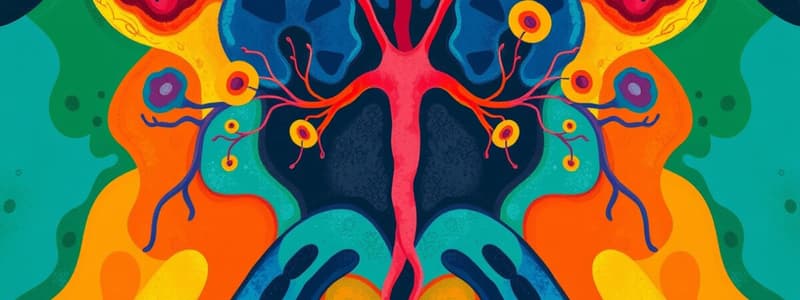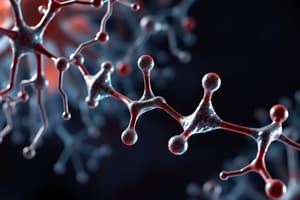Podcast
Questions and Answers
Define endocrine, paracrine, and autocrine.
Define endocrine, paracrine, and autocrine.
Endocrine: Hormones are released into circulation to act on a distant target organ (i.e. TSH, ADH); Paracrine: Hormones act locally on cells close to where they are released (i.e. estrogen and testosterone); Autocrine: Hormones produce a biologic action on the cell that released them (i.e. insulin).
What are the different structural types of hormones?
What are the different structural types of hormones?
- Amines and amino acids; 2. Peptides and proteins; 3. Steroids, which are made from cholesterol.
What is the function of the hypothalamus?
What is the function of the hypothalamus?
The hypothalamus serves as a link between the nervous and endocrine systems. It regulates homeostasis, body temperature, hunger, behavior, emotion, and pain.
What is the role of the pituitary gland?
What is the role of the pituitary gland?
Explain the concept of negative feedback and give an example.
Explain the concept of negative feedback and give an example.
Explain the concept of positive feedback and give an example.
Explain the concept of positive feedback and give an example.
Explain the ways in which hormones can be over-secreted.
Explain the ways in which hormones can be over-secreted.
How does decreased hormone secretion occur?
How does decreased hormone secretion occur?
Adrenal insufficiency can be caused by what ways?
Adrenal insufficiency can be caused by what ways?
With Addison's disease, what hormones and lab values will be altered?
With Addison's disease, what hormones and lab values will be altered?
What can cause Cushing syndrome?
What can cause Cushing syndrome?
What are the signs and symptoms of Cushing syndrome?
What are the signs and symptoms of Cushing syndrome?
What lab values will be altered in primary and secondary hyperthyroidism?
What lab values will be altered in primary and secondary hyperthyroidism?
What are signs and symptoms of hypothyroidism?
What are signs and symptoms of hypothyroidism?
What are the roles of insulin and glucagon?
What are the roles of insulin and glucagon?
Define glycogenesis, glycolysis, gluconeogenesis, and glycogenolysis.
Define glycogenesis, glycolysis, gluconeogenesis, and glycogenolysis.
What is insulin resistance?
What is insulin resistance?
What is metabolic syndrome?
What is metabolic syndrome?
What are polydipsia, polyphagia, and polyuria?
What are polydipsia, polyphagia, and polyuria?
What are the primary microvascular complications of diabetes?
What are the primary microvascular complications of diabetes?
What are the primary macrovascular complications of diabetes?
What are the primary macrovascular complications of diabetes?
Flashcards are hidden until you start studying
Study Notes
Endocrine System Terminology
- Endocrine: Hormones released into circulation to distant target organs (e.g., TSH, ADH).
- Paracrine: Hormones act locally on nearby cells (e.g., estrogen, testosterone).
- Autocrine: Hormones affect the cell that released them (e.g., insulin).
Hormone Structural Types
- Amines and Amino Acids: Simple hormone structure derived from amino acids.
- Peptides and Proteins: Chains of amino acids forming larger hormone molecules.
- Steroids: Hormones derived from cholesterol.
Hypothalamus Functions
- Bridges nervous and endocrine systems.
- Controls functions of other endocrine glands via the pituitary gland.
- Regulates homeostasis, body temperature, hunger, and pain.
- Produces releasing hormones that stimulate pituitary hormone release.
Pituitary Gland Role
- Known as the "master gland" due to its role in stimulating other endocrine glands to release hormones.
Negative Feedback Mechanism
- Maintains homeostasis by monitoring and adjusting hormone levels.
- Prevents over-secretion of hormones.
- Example: ADH release decreases when blood becomes dilute, stopping further secretion.
Positive Feedback Mechanism
- Enhances hormone release in response to stimuli.
- Example: Oxytocin increases uterine contractions, leading to more oxytocin release.
Hormone Over-Secretion Causes
- Pathological over-secretion by target glands.
- Excessive stimulation from the pituitary or hypothalamus.
- Hormones produced by neoplasms (tumors) in other sites.
- Genetic mutations affecting hormone receptors.
Hormone Under-Secretion Causes
- Disorders of the target gland, either congenital or acquired.
- Insufficient stimulating hormone from the pituitary.
- Inadequate releasing hormone from the hypothalamus.
- Defective hormones or unresponsive target organ receptors.
Adrenal Insufficiency Causes
- Primary adrenal insufficiency, such as Addison's disease due to adrenal dysfunction.
- Secondary adrenal insufficiency, from decreased ACTH stimulation.
- Tertiary adrenal insufficiency, from decreased CRH from the hypothalamus.
Addison's Disease Impact
- Insufficient secretion of cortisol and aldosterone results in high ACTH levels.
- Low aldosterone leads to low sodium and high potassium levels, causing hypotension.
Cushing Syndrome Causes
- Latrogenic causes from long-term steroid treatment.
- Over-secretion by adrenal glands due to adenomas or carcinomas.
- ACTH-secreting pituitary tumors (Cushing's disease) or ectopic ACTH tumors.
Cushing Syndrome Symptoms
- Physical features: buffalo hump, abdominal obesity, round face (moon facies).
- Physiological symptoms: muscle weakness, easy bruising, thin skin, osteoporosis.
- Other symptoms include hirsutism, immunosuppression, and psychological changes.
Hyperthyroidism Lab Values
- Primary Hyperthyroidism: Low TSH (thyroid overactivity).
- Secondary Hyperthyroidism: High TSH (pituitary overactivity).
- Elevated T4 and T3 in both types.
Hypothyroidism Symptoms
- Symptoms include weight gain, fatigue, weakness, bradycardia, and cold intolerance.
- Constipation, joint pain, anemia, and possible goiter may occur.
Insulin and Glucagon Functions
- Insulin: Facilitates glucose uptake into cells to lower blood sugar levels.
- Glucagon: Stimulates glucose release into the bloodstream when levels drop.
Metabolic Processes
- Glycogenesis: Insulin-promoted storage of glucose as glycogen.
- Glycolysis: Breakdown of glucose for energy.
- Gluconeogenesis: Formation of glucose from non-carbohydrate sources.
- Glycogenolysis: Breakdown of glycogen to release glucose.
Insulin Resistance
- Condition where insulin fails to stimulate adequate glucose uptake.
- Often associated with obesity and reduced insulin receptor numbers.
Metabolic Syndrome Overview
- A collection of conditions increasing risks for heart disease, stroke, and type 2 diabetes.
- Key features: elevated blood sugar, high cholesterol, hypertension, obesity.
Diabetes Symptoms
- Polydipsia: Increased thirst.
- Polyphagia: Increased appetite.
- Polyuria: Increased urination.
Diabetes Complications
- Microvascular: Retinopathy, nephropathy, neuropathy.
- Macrovascular: Peripheral vascular disease, coronary artery disease, heart attacks, and strokes.
Studying That Suits You
Use AI to generate personalized quizzes and flashcards to suit your learning preferences.



